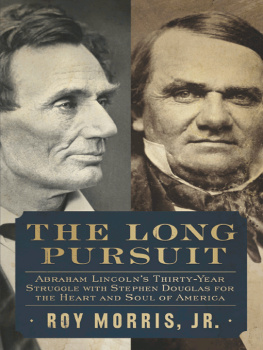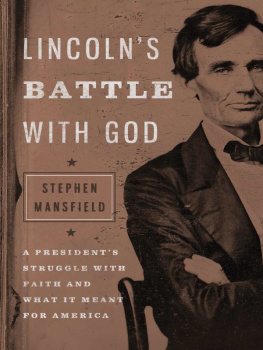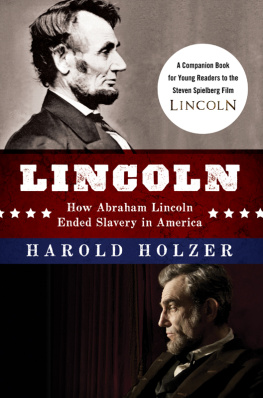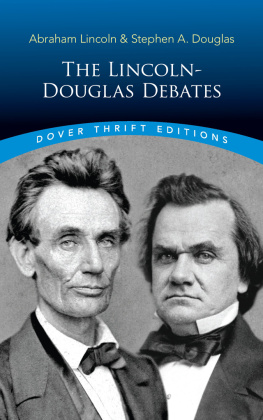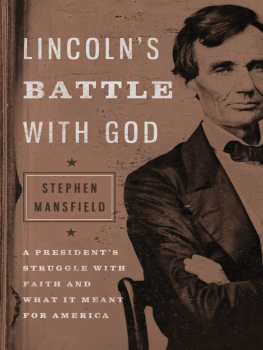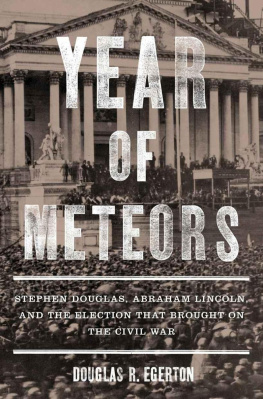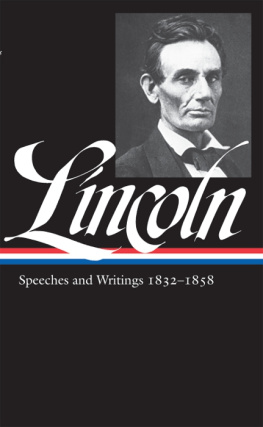Abraham Lincolns Thirty-Year Struggle with Stephen Douglas for the Heart and Soul of America
Roy Morris, Jr.
O ne stands today as perhaps the most revered figure in American history. The other is remembered, if at all, for a hard-fought election victory that most people believe mistakenly was a defeat. The gap between the two could scarcely be wider. Yet for much, indeed most, of their careers, Abraham Lincoln and Stephen Douglas held vastly different positions in the eyes of their countrymen. For the better part of two decades, Douglas was the most famous and controversial politician in the United States, renowned for his defeats as well as his victories, a steam engine in britches who worked tirelessly and combatively for the Democratic Party and, not incidentally, for himself. Lincoln was merely Douglass most persistent rival within their adopted home state of Illinois. A leader in both the House of Representatives and the Senate, Douglas was nearly nominated for president twice in the 1850s. Lincoln served a single undistinguished term in the House, one that he freely admitted was a flat failure. It was not until Douglas passed, almost single-handedly, the Kansas-Nebraska Act of 1854, ushering in half a decade of unprecedented civil strife in Kansas, that Lincoln reentered politics and began his inexorable and seemingly inevitable rise to the White House. Had it not been for Douglas, Lincoln would have remained merely a good trial lawyer in Springfield, Illinois, known locally for his droll sense of humor, bad jokes, and slightly nutty wife. Nationally, he was barely known at all.
If, as Lincoln said, there was a race of ambition between the two men, until 1860 Douglas not only led the race, he virtually lapped Lincoln in the backstretch. While Douglas had little need for Lincoln, Lincoln badly needed Douglas, both personally and politically, as a goad, a pace horse, and a measuring stick. When Lincolns law partner, William Herndon, remarked famously that Lincolns ambition was a little engine that knew no rest, he might well have added that it was the portly, combative figure of Stephen Douglas who stoked the engine. It is doubtful that Douglas, who had many rivals, ever fully realized how intensely Lincoln studied, plotted, and mulled over Douglass every move. He had the time. While Douglas strolled the marble halls of Congress, trailing friends and foes behind him in a cloud of smoke from his ever-present Cuban cigar, Lincoln trudged the muddy streets of Springfield alone and climbed the back stairs to his paper-strewn law office on the second floor above a haberdashery. His one link to the outside world was the stack of out-of-town newspapers that he read each morning as avidly as a marooned sailor reads strange footprints on a beach. Whenever Douglas returned to Illinoisand it was more and more infrequentlyLincoln was usually on hand to hear what he had to say and to respond, invited or not, to his remarks. In his shambling, slightly hangdog way, Lincoln functioned as a one-man truth squad for Douglass often flexible public pronouncements. Inherently honest himself (although not entirely immune from the professional politicians constant temptation to stretch the truth as far as it might credibly stretch), Lincoln watched Douglas perform his regular philosophical about-faces with a certain degree of amused wonder, if not necessarily admiration. Douglas, he said, did not tell as many lies as some men I have known, but I think he cares as little for the truthas any man I ever saw.
Like all ambitious politicians growing up in America in the 1830s, Lincoln and Douglas entered public life in the overbranching shadow of Andrew Jackson, and each man defined his political philosophy by how strongly he supported or opposed Jacksonian democracy. From boyhood, Douglas imbibed the heady brew of street-level, common-man politics as embodied by the far from common figure of Andy Jacksoncommanding general, plantation (and slave) owner, and natural-born elitist. It was a tenet of faith with Douglas that the voice of the people spoke most loudly and clearly when it bubbled up naturally from below.
Race was the crucible in which the Lincoln-Douglas rivalry was fired. Ironically, it was the frontier-born Lincoln, a son of slave-state Kentucky, who better intuited the corrosive effect that slavery hadand was havingon the nation as a whole. Douglas, born and reared in free-state Vermont, exhibited a perplexing, lifelong obtuseness on the issue. For him, slavery was essentially a political question, of interest mainly to the high-strung southerners who profited from it. Taking his cue from the Missouri Compromise of 1820, which sought to manage the conflict by separating the slave and free regions of the country much as a boxing referee separates two clinching fighters, Douglas devoted his career to seeking workable solutions to the question. To him, slaves were merely a form of property, different in kind but not in law from land or horses or cattle, and owners had a God-given right to manage their property. Beyond that, and perhaps more to the point, slaves could not vote, and Douglas was nothing if not a politician, the most gifted perhaps of his generation. Lincoln, while no wild-eyed abolitionist, had a deeper well of sympathy, forged in part by his own dirt-poor childhood, which allowed him to see black men and women as recognizable human beings engaged in the age-old struggle for food and shelternot entirely equal to white men, perhaps, but certainly deserving the right, as he often said, to eat the bread they earned with their own hands. While no less political than Douglas (and personally more aloof and inward-looking), Lincoln could see beyond the voting booth. Men, at any rate, could not eat ballots.
For nearly three decades, well before the issue of slavery tore the nation apart, Lincoln and Douglas battled each other for political supremacy on street corners, public squares, and village greens. In so doing, they helped define and determine the course of American politics during its most convulsive era. It was an accident of timing that plunked these two larger-than-life individuals down in the same thumbprint-sized corner of backwoods Illinois, yet it now seems almost mystically predetermined that they would take their great debate, so to speak, onto the national stage. How completely Lincoln won that debatewith the eventual help of 2 million blue-clad Union soldiersexplains in part why Douglas is so comparatively forgotten today. History, as they say, is written by the winners. Despite his many electoral, legislative, and personal victories, Stephen Douglas eventually lost the political war with Abraham Lincoln the same way that he lived his lifelargely, loudly, and comprehensively. But while it lasted, it was quite a fight.

